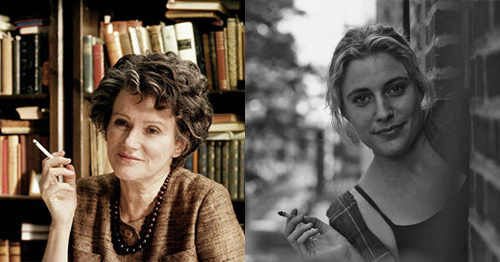Here’s a kind of crazy comparative analysis of two movies I saw recently: Hannah Arendt and Frances Ha. One thing they have in common is that they both have their respective protagonists’ names as their titles. But, if you can believe it, the similarities don’t stop there. In each film the protagonist is portrayed by a magnetic actress. The intense Barbara Sukova plays Arendt and Frances is played with aplomb by the skilled comedian Greta Gerwig. Now you may be wondering what an intellectual powerhouse like Arendt has to do with a somewhat clumsy, searching 27 year old dancer named Frances. Well, interestingly, both of these films happen to be portraits of woman who do not conform to the pressures around them. They are women who continue to stick to their path despite the personal costs involved in their choices. Their authentic pursuits, intellectual and creative, are the source of their cinematic triumph at the end each film.
Hannah Arendt chronicles the period in which Arendt wrote Eichmann in Jerusalem, first as a five part series while covering the trial for the New Yorker and then in book form. The director Margaret von Trotta has managed to make a thriller of sorts out of the material and debate surrounding the conclusions Arendt made after observing the trial. Her controversial positions included the idea that Eichmann was not a monster, but instead a nobody – a person who had so surrendered himself to authority that he could no longer think and make moral judgements. The other position for which she was relentlessly punished was the notion that the Jewish leadership held some responsibility in the deportation of fellow Jews. Arendt lost friends and colleagues and suffered from what she described as character assassination from those who did not read or understand what she had actually written. At the end of the film she gives an inspiring speech to critical colleagues and adoring students in which she defends her ideas and moral imperative of the intellectual pursuit of knowledge.
Frances, unlike Hannah is not part of an milieu of intellectuals in exile (though she does painfully and narrowly miss a fabulous dinner party in Paris with a painter couple, a philosopher, and a man looked like Jean Pierre Leaud). She is firmly planted in contemporary New York City, where coddled young adults shoot the shit and whittle away the days with low or no paying jobs and varying degrees of vaguely artistic and professional ambition. She is struggling. She is broke. She wants to be a dancer but gets cut from her company. Throughout the film she endures disappointment, failure, bad luck and bad choices. In a dinner party scene with a selection of successful new Yorkers we see how Frances is unable to conform to the conventional bourgeois notions of what a NYC adult should be: professional with a respectable career (lawyer), two homes (pied a terre in Paris), able to make polite conversation over fine fine food and the ability to hold liquor. She simply does not fit in. Yet despite her awkwardness and setbacks she remains doggedly connected to herself, even if that self isn’t yet sorted out. In the end her commitment to dance and fundamentally to herself gets her through as string of humiliations. As she embraces new choices she is on her way to becoming a burgeoning choreographer and has scored an apartment of her own. In the end Frances gets the last laugh.
